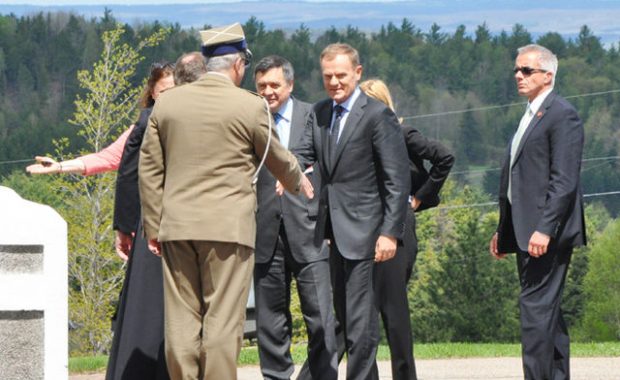WILNO – Polish Prime Minister Donald Tusk started his three-day visit to Canada with a journey to Wilno that surely touched his heart.
On May 13, he arrived via helicopter at the Chippior Farm and was transported by car to the Polish Kashub Heritage Park.
Tusk, who is Poland’s first Kashubian prime minister, was greeted by local dignitaries and representatives from the Wilno Heritage Society, who gave him a tour of the park.
He paused to reflect on all of the effort that is being put in locally to preserving the Kashubian culture.
“It’s a wonderful place,” PM Tusk told the Gazette. “I am so impressed because it’s the most important heritage for me personally – because I am also Kashubian.”
Shirley Mask Connolly is the curator at the park museum. She ushered him through the museum, took him to see the heritage stones, and gave him a tour of the farm house on the park grounds.
“It’s a great honour having somebody so distinguished as the prime minister of Poland wanting to visit us,” she said. “It’s an absolutely great honour and I am thrilled.”
Tusk met with the Kashubian royal family, which consists of locals who were given the title at the 2012 Kashub Day festival in Wilno. Princess Brittany Yantha, Prince Jonathan Stoppa, Queen Theresa Prince and King Ben Burchat all shook the prime minister’s hand.
During this time, local fiddler Ray Chapeskie played a traditional Polish waltz called Little Augustine. He said he never thought he would be playing for the prime minister of Poland.
“We are the same heritage and we have a blood connection,” he said. “It’s a milestone for the Kashub people to have a prime minister in what is now our home country.”
The song was passed down from his forefathers.
Afterwards, Tusk was asked to plant a Lipa (or Linden) tree at the park, a tree that is culturally significant to the Kashubian people.
Mask Connolly said the Lipa tree was chosen because the main parish of origin of Canada’s Kashub people is Lipusz, which is named after the Linden tree. As it grows, the tree will produce bright yellow blossoms.
“The Lipa tree is a very important old Slavic symbol,” she said. “It has a double significance.”
Afterwards, he was taken to the St. Stanilaus Pioneer Cemetery, where he toured the graves of Kashubian pioneers. At a luncheon later at St. Mary’s Catholic Church, he told the audience he felt as if he was visiting the graves of his relatives and his ancestors.
“Those stones were our stones,” he said.
When he arrived at the church in Wilno, around a dozen peaceful protestors lined the parking lot to object to Tusk’s visit.
They essentially blame the prime minister for the plane crash in Russia on April 10, 2010 that led to the death of 96 people, including President Lech Kaczynski.
Bad weather conditions have been ruled as the cause of the incident.
The plane crash happened merely days before Tusk’s scheduled visit to Canada.
David Shulist is the Mayor of Madawaska Valley and was the president of the Wilno Heritage Society when Tusk was supposed to make his way to Wilno two years ago.
He said the death of the president and other dignitaries was a shock to this area.
“I know that the Polish people and the Kashub people are a very strong people,” Shulist said. “They have gone through many tragedies and this was just one of them. It was a great loss.”
But he said the recent visit was a way to reconnect with the country and recover from the tragedy.
“This is a big moment,” Shulist said in an interview with the Gazette. “I feel so proud. I have been waiting for this for a long, long time.”
The mayor said the prime minister’s visit will put Wilno and surrounding communities on the map.
“For the Madawaska Valley, it means everything,” he said. “This is a way to go and promote our area to the rest of the world. It shows that we are a community that attracts world leaders.”
Shulist’s dad, Martin Shulist, was integral in promoting the area’s rich cultural heritage.
“My dad would be tickled pink right now,” he said. “He wouldn’t believe that this would happen. The work that he had done in the 60’s and 70’s is paying off.”
But he credits the work of the heritage society in the past 14 years for making the park come alive.
“We have taken this ground from nothing and turned the soil to pay dedication to our pioneers,” Shulist explained.
The Kashubian people, he said, are a minority, and do not “rise as much as we should.”
“Donald Tusk will make us stand up tall and be recognized as Kashubian people that are making a difference in the world,” Shulist explained.
Peter Glofcheskie is the current president of the Wilno Heritage Society.
“We are very, very pleased that Donald Tusk is visiting us,” Glofcheskie said. “He is a Pole and is also a Kashub and
he chose to come see us.”
he chose to come see us.”
Glofcheskie said the heritage society put “more work than money” into bringing the prime minister to the area. He credited the Polish embassy for arranging the visit.
“It would be very interesting to know what our ancestors would have thought at having the Polish prime minister come to visit,” he said. “I hope they would be proud the way the Wilno Heritage Society and others are trying to keep our Polish-Kashub spirit alive.
Story continues in the May 16 issue of The Valley Gazette.
